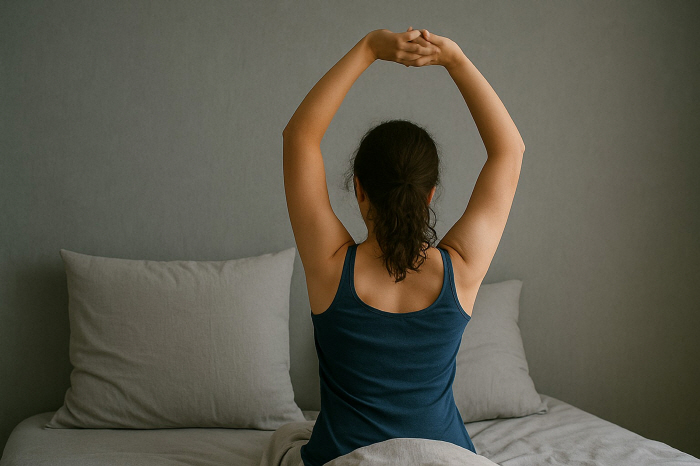A night of sleeplessness due to the late heat...Practice this to get a good night's sleep
Aug 28, 2025
|
Sufficient sleep dissipates fatigue and stress at once, and lack of sleep leads to fatigue and disrupts daily life the next day. According to several studies, chronic insomnia is not just a lack of sleep, it increases the risk of developing other diseases.
Park Jung-hoon, director of the Department of Neurology at Incheon Himchan General Hospital, said, `Sleeping is an important process of restoring fatigue accumulated during the day and reorganizing brain functions.' `Continuous sleep deprivation can be accompanied by decreased concentration, memory loss, and depression, so active management is necessary.'
◇ 8.1 times higher cardiovascular disease mortality rate for insomnia patients...Spinal pain also worsens
Sleep is closely related to body temperature control. In general, our body's body temperature gradually rises during the day and rises in the evening, and then gradually falls at night, promoting the secretion of melatonin, a sleep hormone, and falling into a deep sleep. However, sweat does not evaporate properly in hot environments until night, especially when humidity is high, which can delay body temperature drop and interfere with melatonin secretion, resulting in poor sleep quality.
It is known that the temperature of an appropriate sleeping environment is around 24~26℃ and the humidity is around 50~60%.
Eating habits also affect sleep. If you eat high-moisture foods such as cold drinks or watermelons in the late evening to cool off, you will wake up often due to the increase in the number of awakenings during sleep due to night urination. Also, overeating at night or eating stimulating food is not good for sleep. In particular, spicy food interferes with sleep by raising gastrointestinal temperature, and fatty food causes stomach acid reflux, causing discomfort.
Sleep Is Essential to Strengthen Your Immune System During sleep, our bodies repair cells, regenerate damaged tissues, and strengthen your immune system. It also produces proteins such as cytokines needed to fight infections. Chronic sleep deprivation causes physical and mental problems, increasing the risk of developing several diseases such as cardiovascular disease, metabolic disease, depression, and dementia.
According to the Journal of Clinical Sleep Medicine (2017), insomnia patients had 8.1 times higher cardiovascular mortality than those without sleep disorders. This is because if you do not sleep well due to insomnia, blood pressure does not decrease and the sympathetic nervous system is excessively activated. In addition, the Clinical Neurology (2023) paper said that less than five hours of sleep a day increases the risk of developing depression by 3.74 times.
In particular, insomnia and back pain are in a vicious circle with each other. The Korean Journal of Pain (2015) paper reported that 43% of chronic low back pain patients suffer from insomnia, pointing out that insomnia increases pain intensity and makes the prognosis worse. In addition, a study in the Journal of the North American Society (2023) shows that lower preoperative sleep quality results in higher postoperative pain scores, indicating that sleep deprivation can negatively affect recovery by increasing pain sensitivity.
◇Sunshine during the day and avoid using smartphones at night
To prevent insomnia, it is important to have a lifestyle that allows you to get normal sleep.
First of all, get plenty of sunshine during the day. When we get sunlight, our body's biological clock works normally and the release of serotonin, a wake-up hormone, is promoted. This serotonin is converted to melatonin at night to help you sleep well.Regular exercise is very helpful in inducing a good night's sleep. However, it is better to avoid intense exercise three hours before going to sleep because it stimulates sympathetic nerves and interferes with sleep. Blue light from electronic devices inhibits melatonin secretion and interferes with sleep, so stay away from your smartphone two hours before going to sleep. Also, before going to sleep, it is recommended to have time to relax your body and mind comfortably, such as taking a shower or meditating with warm water.
It is also important to maintain a proper sleeping posture. Sleeping on your stomach or lying on your side in a position where your shoulders and pelvis are out of alignment can put pressure on your spine. Lee Dong-chan, director of neurosurgery at Mokdong Himchan Hospital, said, `The wrong sleeping position puts pressure on the spine, causing pain, which can lead to a vicious cycle of poor sleep quality again"A good sleeping position is to relax the lumbar spine by using a pillow at an appropriate height when sleeping in a lying position, a low pillow under the knee, a pillow that fits your shoulder height when sleeping on your side, and a low pillow between your legs."
|
This article was translated by Naver AI translator.















